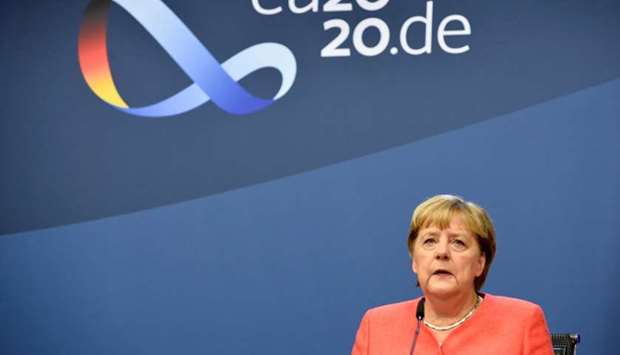* Significant differences remain in trade talks
German Chancellor Angela Merkel on Friday said she had no breakthrough to announce in EU talks with Britain but remained optimistic that sealing a deal on a new trade relationship after Brexit was still possible before the end of the year.
With just under two weeks before what both British Prime Minister Boris Johnson and the EU have set as a deadline for reaching a trade agreement, there were still significant hurdles to finding a way to smooth relations when a standstill post-Brexit transition arrangement ends this year.
"I can't announce a breakthrough," Merkel told a news conference after two days of talks among the 27 national EU leaders in Brussels, including on Brexit. "As long as negotiations on Brexit are ongoing, I'm optimistic."
Ireland's Prime Minister Micheal Martin said earlier on Friday Britain must respect the Brexit arrangements it had agreed with the bloc for the sensitive Irish border as a fraught week with little progress towards a new trade deal wrapped up.
Johnson will speak to the head of the EU's executive, Ursula von der Leyen, on Saturday to assess the negotiations on their future relationship and agree next steps after the bloc launched a legal case against Britain over their earlier divorce deal.
Speaking after the summit on Friday, von der Leyen said it was time to "intensify" Brexit talks with time available by the end of the year to put a new deal in place running out.
"Where there's a will, there's a way," she said.
"We have made progress on many, many difficult fields but the main ones all remain very much open," she added, naming guarantees on a level playing field of fair competition as a key sticking point. "There is still a lot of work to do."
With some businesses increasingly concerned over what shape trading terms will be in at the end of the year, analysts at U.S. Citi bank said they expected the two sides to agree "a rudimentary Brexit deal".
JPMorgan also said on Friday it continued to think that a Brexit trade deal was more likely than not, though the substance of any agreement would be narrow and come with a cost for the United Kingdom.
Martin told his EU peers earlier in the day that adhering to Britain's EU divorce bill provisions on the sensitive Irish border was crucial: "That is important in terms of trade, protection of jobs," he said.
Ireland and the EU fear that the UK's new Internal Market Bill, which Britain admits breaks the international law by undercutting some of the provisions in its Brexit divorce deal, could threaten the fragile peace on the island of Ireland.
The United Kingdom says it must break the divorce deal provisions to allow England, Scotland, Wales and Northern Ireland to trade freely with each other if there is no post-Brexit trade deal with the EU.
But some fear that risks re-erecting a border on the island of Ireland and undermining a 1998 peace accord which mostly ended three decades of sectarian conflict.
U.S. special envoy for Northern Ireland Mick Mulvaney said in London the message he would take back to Washington was that all sides were committed avoiding that.
Beyond the border controversy, disagreements in trade talks remain over state aid, fisheries and ways to solve disputes.
The estranged allies will continue trade talks until the next summit of the bloc's leaders is due to assess on Oct.15-16 the progress.
They could switch to contingency planning for the most damaging economic split without new arrangements at the end of the year, or - if enough ground is covered - approve a final push known as "tunnel" talks to get a deal across the line.
The EU says a deal must be at hand by early November to give the European Parliament and some national parliaments enough time to ratify it before the end of the year.
The bloc is adamant, however, that it would not implement any new UK deal as long as London undermines the divorce treaty.

